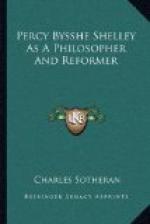This estimate is not overrated, for, having confidence in his mission to humanity, he was fortified by the belief of his existing as an indestructible portion of interminable nature and the universal mind, which in all high intelligences lives through the ages, not only in the individual consciousness of the spirit, but in that immortality of soul or mind, which lives in the race.
He hated the superstitions of Christian Fetishism and tyranny over the intellect, but loved Christ and the other philosophers with a genuine affection; he loved humanity, and was ever fond of examining its highest phases, as, for instance, through the doctrines of perfect equality in the sexes—yet he recognised that sudden changes were prejudicial before sufficient progress had been accomplished. “To destroy, you must replace.” Justice he considered the sole guide, reason and duty the only law. His morality was not that of pharasaical tartuffes, nor of prudish knickerbockers, who with wide phylacteries, sit in the high places to be seen of men. He only combatted evil principles and fought hard in favor of good.
He has been quoted as being too transcendental; he may be to dullards with imperfect reasoning faculties, or theologians, who only see through fanatical and green-monsterish spectacles, but to men who have a live philosophy equally adapted to modern as well as ancient thought, he is as clear as the noon-day sun. All that is required, to comprehend Percy Bysshe Shelley, is integralism of that high order which has ever believed in the ultimate perfectibility of human nature, and looked “forward to a period when a new golden age would return to earth, when all the different creeds and systems of the world would be amalgamated into one, crime disappear, and man, freed from shackles, civil and religious, bow before the throne ’of his own awless soul,’ or ‘of the power unknown,’” whose veil it is the ambition of theosophy to raise for humanity, and remain the “inscrutable” no longer.
I have completed my task, and with humility I make the statement, knowing that before me are many who could have performed it as completely as I have crudely. I look upon my essay, in which I have treated my subject popularly, with intention, as a beacon, whence a little light may be shed dimly, hoping that others, better qualified, will bring you face to face with the full rays.




